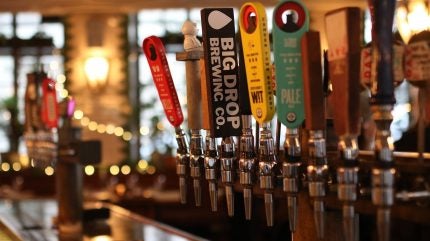
Non-alcoholic options could represent 40% of beer sales in a decade, UK specialist Big Drop Brewing Co. suggests, arguing the market is “going in one direction”.
With global beer consumption flat, the world’s major brewers are investing in the growing but still small market for non-alcoholic beer alongside focused businesses such as Big Drop in the UK and Athletic Brewing in the US.
The share of beer sales made up by non-alcoholic brews remains small. Heineken estimates the category accounts for around 1.7% of sales.
According to figures from GlobalData, Just Drinks’ parent, the global market for 0% beer jumped by more than 40% in volume terms (or at a CAGR of more than 7%) from 2018 to 2023, when the data and analytics group estimates 2.39bn litres were sold worldwide.
However, the share of volume sales in the eight largest markets for non-alcoholic beer is forecast to remain relatively stable up to 2029, GlobalData suggests. The company estimates non-alcoholic beer accounted for just under 14.3% of beer volumes in 2024; it forecasts that will rise to a little under 14.6% by 2029.
“People look to Spain and Germany. That’s how it gets pitched. They look to Spain and Germany … and they say ‘that’s as big as it will get.’ I always say ‘yes but that’s it now. That’s not a cap. That’s not to say that more people in Spain and Germany aren’t going to be drinking alcohol free beer.’,” Big Drop CEO Rob Fink told Just Drinks on the GlobalData Consumer podcast.
“I see no reason why, in the next five to ten years, it doesn’t get up to 20, 30, 40% because why would it not? You’ve got so many headwinds now against alcohol.”
He added: “It only goes in one direction now. The only question is how fast does it go and whether or not the macros [big brewers] can pivot fast enough to an alcohol-free business model.
“There’ll always be a consumption of alcohol. I don’t think that stops. Is it going to be 95% of the business of the big brewers in ten years? I query that but then you’ve got to have businesses that are willing to look ten years in the future versus to their next set of quarterly results.”
In a wide-ranging interview, Fink argues retailers’ early support of smaller brands has waned amid concerns about the rate of sales. Supermarket shelves in the UK, Fink says, have become dominated by brands from the major brewers.
The Big Drop co-founder has long been a big advocate for on-trade operators putting non-alcoholic beer on draught. More landlords are opening up taps but it’s slow going, he said, arguing some are fearful to try out the products.
“The difficult thing to do is to say ‘right, let’s put some alcohol-free beer on draught across 100 pubs.’,” Fink says. “It is coming and it’s getting better. A couple of people just need to put their head above the parapet.”
Before Christmas, Big Drop changed brewer in its domestic market and is working on a new licensing deal in the US.
North Yorkshire-based Black Sheep Brewery is producing for Big Drop’s customers in the UK and continental Europe.
Big Drop has started contract brewing in Singapore and is set to begin production under licence in Australia.
Fink believes customers will look to stock a wider variety of products as the category grows further. “As the sector continues to grow, which I think it will do, it will become more sophisticated,” he said. Supermarkets will want “the mass-produced lager 0.0s” and provide drinkers with “smaller, independent, bigger-flavour profile, craft beer, alcohol-free alternatives”.



